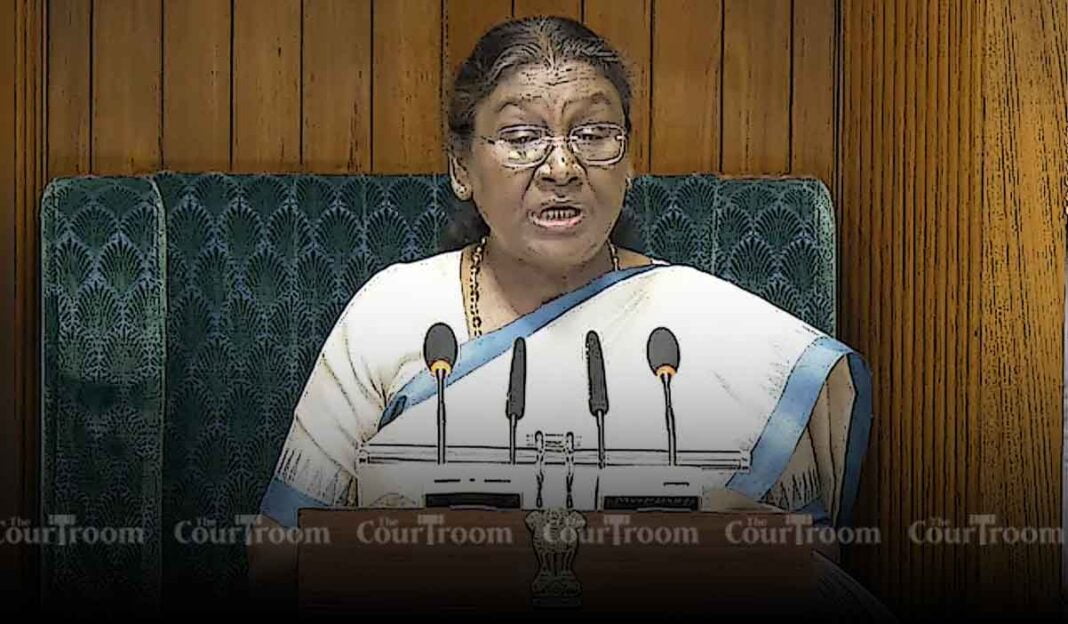In her first address to Parliament following the recent general elections, President Droupadi Murmu described the Emergency imposed in 1975 as the darkest chapter in the history of direct attacks on the Constitution
Speaking to a joint sitting of Parliament, she emphasized that the Constitution has successfully withstood numerous challenges over the decades.
Constitution’s Resilience
“Today is June 27. The imposition of the Emergency on June 25, 1975, marked the most significant and darkest chapter of a direct assault on the Constitution. The entire nation felt the outrage,” President Murmu stated.
Despite this, she noted that the country ultimately triumphed over such unconstitutional forces, attributing this resilience to the core traditions of the republic. Her remarks were met with cheers from the treasury benches and protests from the Opposition. Vice-President Jagdeep Dhankhar echoed her sentiments, noting that the Emergency had “attacked the Constitution.”
Political Context
This address comes amidst a heated exchange between the ruling BJP and the Opposition regarding the Emergency. While Prime Minister Narendra Modi and other central ministers have highlighted the horrors of the Emergency under Indira Gandhi’s government, the Congress and its allies have countered by claiming that an “undeclared emergency” has been in place during the past decade of Modi’s administration.
Opposition’s Push for Constitutional Integrity
The President’s remarks also resonate in the context of the Opposition’s push for constitutional integrity. Both inside and outside the House, Opposition MPs have been brandishing copies of the Constitution, accusing the ruling party of undermining it.
“My Government does not consider the Constitution of India merely a medium of governance; we are striving to ensure that our Constitution becomes part of public consciousness,” President Murmu declared in her address.
Government’s Achievements and Future Vision
The President’s speech, primarily prepared by the government, outlines its achievements and future vision. Following the address, a debate on the Motion of Thanks typically ensues.
Economic Progress
President Murmu highlighted India’s economic progress, noting that the country has become the fastest-growing major economy, moving from 11th place in 2014 to 5th in terms of economic size. She stated that the government aims to make India the third-largest economy, giving equal priority to manufacturing, services, and agriculture. “India is rapidly becoming self-reliant (Atmanirbhar) in every field,” she said.
Addressing NEET Irregularities
She also addressed the issue of irregularities in the National Eligibility cum Entrance Test (NEET), a nationwide exam for medical school admissions. The President assured that the government is fully committed to investigating recent paper leaks and ensuring that the perpetrators are punished. Her comments were met with cries of “NEET” from the Opposition benches.
“Sanctity and transparency are essential in government recruitments and examinations. The government is committed to conducting a fair investigation and ensuring the most stringent punishment for those guilty in the recent paper leak incidents,” she affirmed, urging a bipartisan approach to tackle the issue.
Importance of Parliamentary Functioning
Stressing the importance of smooth parliamentary functioning, President Murmu differentiated between opposition to policies and obstruction of parliamentary proceedings.
“When Parliament conducts its business smoothly, when healthy deliberations take place here, and when far-reaching decisions are made, the people place their confidence not only in the Government but also in the entire system. Therefore, I am confident that every moment of Parliament will be fully utilized and public interest will be given priority,” she concluded.
Share your news, articles, deals, columns, or press releases with us! Click the link to submit and join our platform today.


